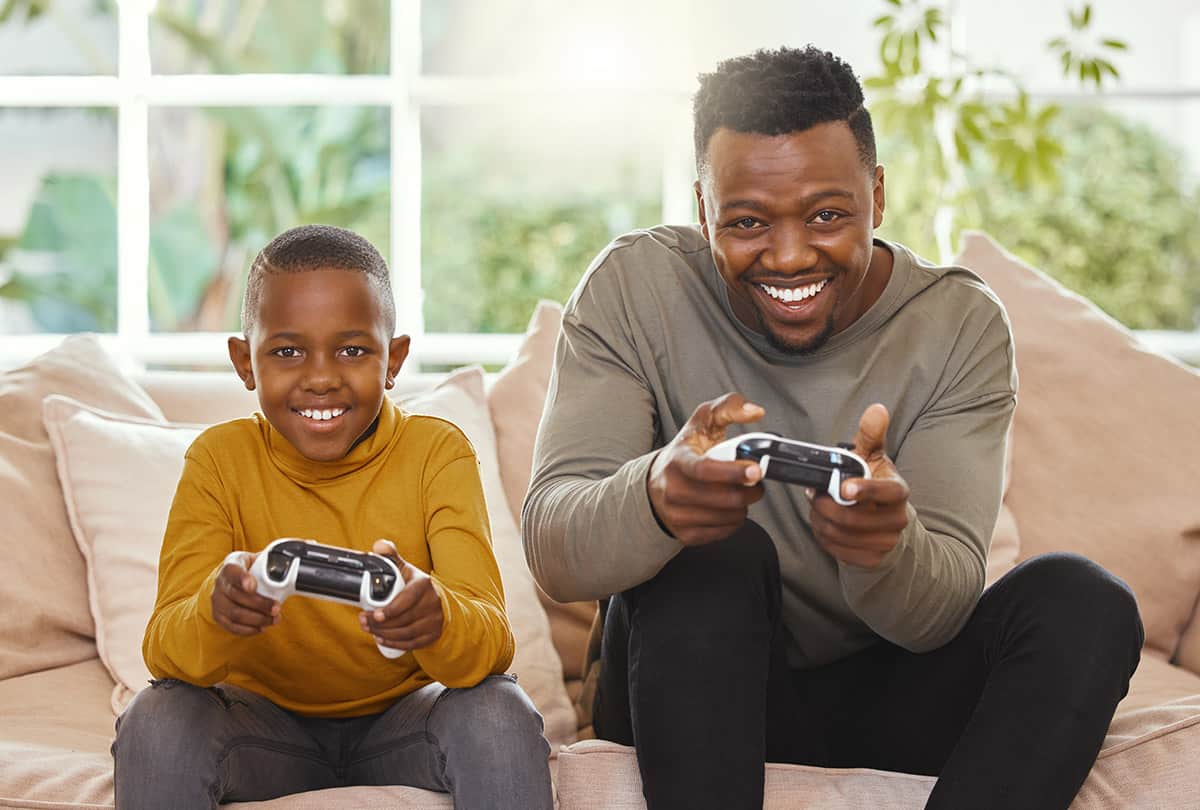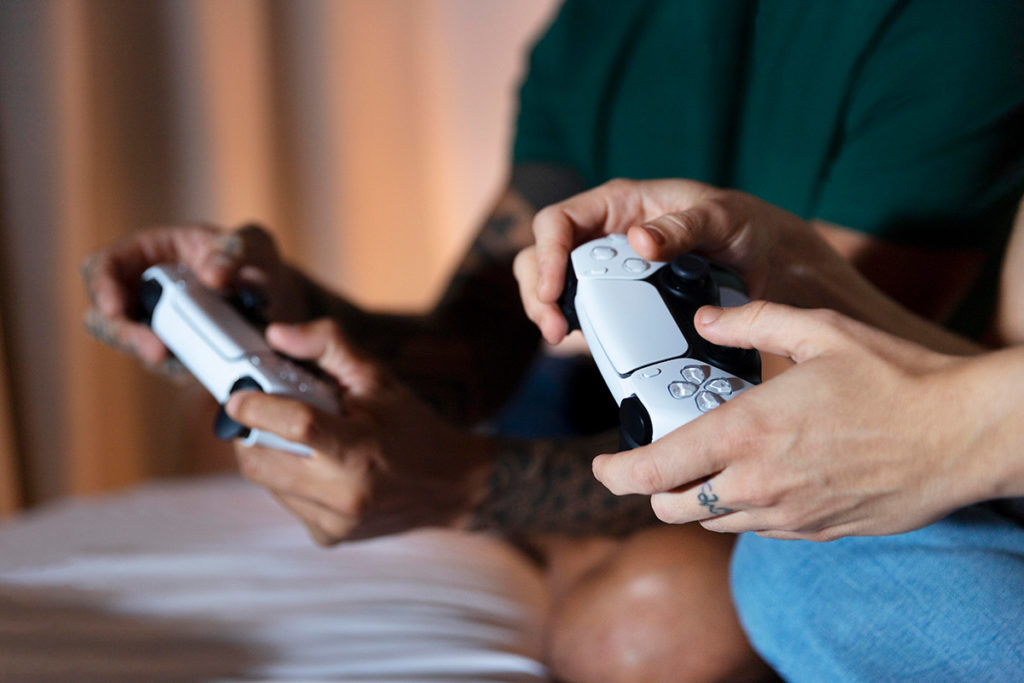
Healthy Gaming Habits for Kids, Teens and Adults
Video gaming is the most popular form of entertainment worldwide among children and adults alike. People play video games to connect with friends, overcome challenges, explore alternate worlds, develop interesting careers and just for fun.
However, gaming is an activity that occurs on a spectrum, from healthy at one end to harmful at the other end.
In this article, we look at the positive and negative effects of gaming and share some healthy gaming tips for kids, teens and adults.
Gaming out of control? Get immediate help for you or your loved one’s gaming problem. Book a free Gameplan call now to learn if our program is the right fit for you.
Video game statistics

There are over 3 billion gamers globally which means that almost 40% of the world’s population plays video games.
Most people have a healthy relationship with gaming and it is one of many interests and activities they enjoy. However, around 10% of gamers are at risk of playing problematically – which means that gaming has a negative impact on their life. Research finds between 2-3% of gamers globally struggle with a video game addiction.
Let’s take a closer look at video game use among adults and young people:
- 91% of people under 18 years old in the US play video games.
- 8.5% of youth aged 8-18 are ‘pathological players’ – their video game habits are causing family, social, psychological or school problems.
- Gaming is the top interest of boys aged 8-15 out of a list of 30+ interests and the second highest interest among 8–11-year-old girls.
- 64% of US adults play video games regularly.
- The average age of a gamer is 34 years old, while the average age of a gaming addict is 24 years old.
- 30% of UK gamers admit skipping a shower or missing a meal to play video games.
- 55% of gamers reported playing more during the COVID-19 pandemic.
As the number of gamers worldwide continues to rise, there will be an associated increase in people with video game addiction. That’s why developing healthy gaming habits is crucial.
What is healthy gaming?

Healthy (or positive) gaming is when people play video games as one of many activities in their life. They spend time with family, go to work or school, have real-world friends as well as online friends, and enjoy other interests besides gaming.
Gaming follows a predictable pattern we call hook, habit and harm. A gamer likes playing video games, they are hooked by the fun, stimulation, challenges, sense of conquest, skill-building, friendships and social aspect of playing with others. Modern video games are specifically designed to hook a young person’s brain to want more and more of it. And that is when harm can occur. Read our article on the pros and cons of gaming.
When gaming is a positive habit, it is a regular part of life – people make time to play games, but they still manage to get school or work and other responsibilities done. There are several notable benefits from playing video games in moderation. Find out about the positive effects of gaming.
What is unhealthy gaming?

For some people, their gaming habit begins to create harm in their life. It starts to become a greater priority, cutting into time spent doing other activities. It can negatively affect their mental and physical health, family and relationships. They may be eating poorly, not sleeping well, not exercising regularly or getting outside. Other harms include anxiety, low moods, irritability and depression. Socially, some gamers become more isolated and anxious and have difficulty making friends and interacting with others in the physical world.
Here are some common signs that playing video games has turned into an unhealthy habit. A gamer may:
- Lose interests in sports, lose interest in friends, lose interest in school or work or hobbies
- Make gaming a priority above everything else and talk only about video games
- Lack motivation for anything but gaming
- Be moody, irritable, depressed or anxious
- Show no interest or joy in anything
- Withdraw from family and friends
- Develop poor eating, sleeping, hygiene habits – may stop brushing teeth or showering or stay up all night to game
- Consume a poor diet
- Use excessive caffeine or other stimulants to game
- Have physical aches and pains such as headaches or back strain
- Skip classes or work, or drop out of school or work
- Have conflict with family members about time spent gaming or how it is affecting them.
Sometimes, a gamer may have tried to cut down but be unable to stop or reduce their gaming. They may be lying about their gaming or hiding when or how much they game. Some wake up to play through the night, drink high caffeine energy drinks or other stimulants and suffer the knock-on effects of sleeplessness through the day. Find out more about the negative effects of gaming.
Healthy gaming tips

Are you concerned about the amount of time you spend gaming? Is your child or teen showing signs of video game addiction? Here are some tips to help you and your family develop healthy gaming habits.
Healthy gaming habits for kids
Parents should be responsible for setting rules and limits for their child.
- Have gaming in a communal area of the house, not their bedroom
- Ask your child to explain what they are playing to check it’s age appropriate – ideally, get involved in their gameplay
- Find out who your child is playing with
- Make sure they get schoolwork and other responsibilities done before gaming
- Suggest games that move the body, like dance apps
- Make sure your child plays other games in addition to video games
- Encourage them to get outside and play
- Stop gaming an hour before bed
- Keep them hydrated with water
- Have limits – the recommendation is 30 minutes on weekdays, one hour per day on weekends
- Make sure your child understands safety rules – no giving out personal information on chats.
Healthy gaming habits for teens
Gaming limits and rules should be agreed by parents and teens.
- Get schoolwork and other responsibilities done first, before gaming
- Take breaks to move around and stretch
- Keep gaming in a communal area of the house
- Make time to socialize with real life friends
- Make daily physical activity or sports a priority, go outside for a walk every day
- Stop gaming an hour before bed
- Stick to your limits – decide how much you will play, then set an alarm and stop when it goes off
- Stay hydrated with water and limit caffeine and stimulants, avoid junk snacks
- Understand safe gaming – no giving out personal information online.
Healthy gaming habits for adults
- Limit your gaming to certain times and places, use a schedule to keep it in balance
- Keep gaming out of the bedroom to avoid disrupting sleep
- Use an alarm to let you know the time is up if you tend to ‘lose yourself’ in the game
- Choose games that are positive experiences instead of negative ones, especially with toxic play and overspending
- Minimize blue light from screens by using blue light minimizing glasses or modes on your screens, as blue light interferes with our sleep schedules
- Keep hydrated and take breaks to stretch and move
- Limit caffeine and stimulants while playing
- Eat healthily and avoid junk snacks.
- Review how much you’re playing every week and adjust it accordingly
Need help to control gaming?

If you or a loved one have tried these healthy gaming tips and still need help, book a Gameplan call to discuss your situation. Limited spots are available.
At Game Quitters, our Respawn program helps gamers detox from gaming and get their life back on track. Our Reclaim program helps families reduce conflict and manage problem gaming.
Other resources include:
- Game Quitters community forum to connect with like-minded people
- Articles and resources for gamers, parents and professionals
- Hobby tool for activities to enjoy as well as or instead of gaming
- Case studies of former video game addicts for inspirational stories
- Gaming Disorder Clinical Training for mental health professionals.
